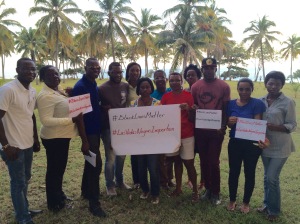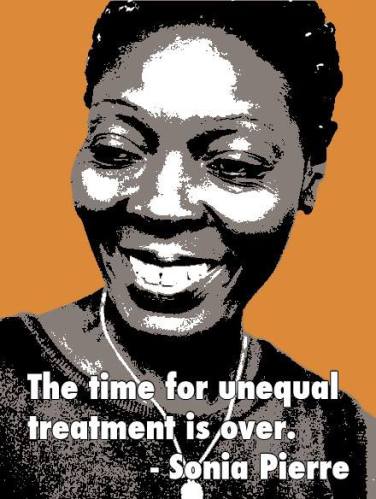
On Sunday, August 9, We Are All Dominican will be participating in the Dominican Day Parade in New York City as an expression of solidarity with our Dominican brothers and sisters of Haitian descent who have been stripped of their citizenship and face the threat of expulsion from the only home they’ve ever known. We will march in celebration of the rich diversity of the Dominican people, particularly our Afro-Dominican heritage, and as an affirmation that Black Lives Matter in the U.S., in the Dominican Republic, and around the world. We will march for our vision for a more inclusive Dominican society, one that does not marginalize and disenfranchise its most vulnerable citizens.
We have been heartened in recent months by the solidarity and activism of justice-loving people in the Dominican Republic, the United States, and elsewhere, in defense of the rights of Dominicans of Haitian descent. On two trips to the Dominican Republic this year, the organizers of We Are All Dominican have been inspired by the immense strength of Dominicans of Haitian descent in organizations such as Reconocido, MOSCTHA, and MUDHA, who have mobilized in the courts, in government administrative offices, on the streets, and in the bateyes to defend their rights. Prominent Dominican journalists such as Juan Bolívar Díaz and Marino Zapete have powerfully stood up for Dominicans of Haitian descent, even in the face of intimidation and death threats.
Last month, we were honored to have taken part in the Movement for Black Lives convening in Cleveland, where we were joined by two fierce human rights activists, powerful Dominican women of Haitian descent, who came to speak directly about their struggle in the Dominican Republic. It was a global black family reunion of 1,500 brilliant activists and organizers that included thoughtful dialogue about what is respectful transnational solidarity. The organizers of the the convening were intentional about creating space to discuss the movement for human rights and against anti-blackness in the Dominican Republic. Participants from the U.S and Europe learned about denationalization in the DR and were moved to action. Similarly our family from the Dominican Republic were witness to testimonies from families of people murdered by police and saw themselves reflected in their pain. The diversity of our various struggles were highlighted throughout the convening while centering blackness and the importance of continuously making connections across borders.
Throughout the summer, members of the Dominican and Haitian diasporas, and our allies, have marched in New York City, Miami, Chicago, Boston, Washington, DC, and Montreal in solidarity with our brothers and sisters facing denationalization and expulsion from their home.
Now we are bringing the #DRSummerOfJustice to the Dominican Day Parade to express our ongoing commitment to the struggle for for racial justice and equality in the Dominican Republic. For years, tens of thousands of Dominicans of Haitian descent have seen their lives paralyzed as their own government refuses to recognize their nationality and grant them the identity documents needed to go to school, work, get married, register one’s children at birth, and other basic life activities. As immigrants and the children of immigrants ourselves, Dominican-Americans know firsthand the marginalization and discrimination that migrants and their families face all over the world. We must join the struggle of Dominicans of Haitian descent to restore their right to a nationality.
While We Are All Dominican does not support a tourism boycott of the Dominican Republic, we urge all Dominican-Americans, particularly our elected representatives, to come together to hold the Dominican government accountable for years of egregious human rights violations against Dominicans of Haitian descent. We cannot sit silently as tens of thousands of our brothers and sisters of Haitian descent face statelessness and expulsion from the only home they have ever known.
As Dominican-Americans we must make a greater effort to engage in dialogue with our families, friends, co-workers to discuss the commonalities between the Dominican government’s discriminatory immigration and citizenship policies and the structural racism faced by black and brown communities in the United States. We must continually ask ourselves how we can continue to build and heal within our communities.
We will march on Sunday’s Dominican Day Parade as an act of healing. This celebration of our diversity is an essential part of the struggle for human rights in the Dominican Republic and among its diaspora. We wish to commemorate heroines such as Mamá Tingó, Sonia Pierre, and all of the men and women who tirelessly fight for justice in the Dominican Republic. We will march in solidarity with our brothers and sisters of Haitian descent who have been denied their nationality and declare that we are ALL Dominican.
We Are All Dominican (Todxs Somos Dominicanxs) marchará en el desfile dominicano en solidaridad con los/as dominicanos/as de ascendencia haitiana
El domingo, 9 de agosto, Todxs Somos Dominicanxs (We Are All Dominican) participará en el desfile dominicano en la ciudad de Nueva York como una expresión de solidaridad con nuestros/as hermanos y hermanas dominicanos/as de ascendencia haitiana, quienes han sido despojados/as de su ciudadanía y enfrentan la amenaza de expulsión de la tierra que los/as vio nacer. Vamos a marchar en la celebración de la gran diversidad del pueblo dominicano, sobre todo nuestra herencia Afro-Dominicana, y como una afirmación de que las vidas negras important en los EE.UU., en la República Dominicana, y en todo el mundo. Vamos a marchar por nuestra visión de una sociedad dominicana más inclusiva, una que no margina ni viola los derechos de sus ciudadanos/as más vulnerables.
En los últimos meses nos ha animado ver la solidaridad y el activismo de personas luchadoras en la República Dominicana, los Estados Unidos, y en otros lugares, por la defensa de los derechos de los/as dominicanos/as de ascendencia haitiana. En dos viajes a la República Dominicana realizados este año por los/as organizadores/as de Todxs Somos Dominicanos/as, quedamos abrumados/as al ver la inmensa fuerza de los/as dominicanos/as de ascendencia haitiana en organizaciones como Reconocido, MOSCTHA y MUDHA, quienes se han movilizado en los tribunales, en la Junta Central Electoral, en las calles y en los bateyes para defender sus derechos. Destacados periodistas dominicanos como Juan Bolívar Díaz y Marino Zapete se han pronunciado indiscutiblemente a favor de los derechos de los/as dominicanos/as de ascendencia haitiana, a pesar de recibir reiteradas amenazas.
El mes pasado, tuvimos el honor de haber participado en el Encuentro del Movimiento por la Vidas Negras en la ciudad de Cleveland, donde nos acompañaron dos activistas de derechos humanos, poderosas mujeres dominicanas de ascendencia haitiana, las cuales vinieron a hablar directamente sobre su lucha en la República Dominicana. Fue un encuentro para la familia negra a nivel mundial, 1.500 activistas brillantes, en donde se abordó un diálogo sobre la solidaridad transnacional. Los/as organizadores/as del encuentro priorizaron la creación de un espacio para reflexionar sobre el movimiento por los derechos humanos y actitudes anti-negras en la República Dominicana. Los participantes de los EE.UU. y Europa aprendieron sobre la desnacionalización en la República Dominicana y quedaron motivados/as a aportar a la lucha. Del mismo modo nuestra familia dominican presenciaron testimonios de familiares de personas asesinadas por la policía y se solidarizaron con su dolor. La diversidad de nuestras luchas se destacaron a lo largo del encuentro, destacando la negritud y la importancia de construir lazos que cruzan las fronteras.
A lo largo del verano, la diáspora dominicana y haitiana, y nuestros/as aliados/as, han realizado manifestaciones en la ciudad de Nueva York, Miami, Chicago, Boston, Washington, DC, y Montreal, en solidaridad con nuestros/as hermanos y hermanas que enfrentan la desnacionalización y la expulsión de su propio país.
Ahora el #VeranoPorLaJusticia (#DRSummerOfJustice) llega al desfile dominicano, en donde expresaremos nuestro compromiso con la lucha por la justicia racial y la igualdad en la República Dominicana. En los últimos años, las vidas de decenas de miles de dominicanos/as de ascendencia haitiana han quedado en suspenso por su propio gobierno, el cual se niega a reconocer su nacionalidad y emitir los documentos de identidad indispensables para estudiar, trabajar, casarse, declarar hijos/as al nacer, y otras actividades básicas de la vida. Como inmigrantes e hijos/as de inmigrantes, los dominico-americanos conocemos de primera mano la exclusión y la discriminación que enfrentan los/as migrantes y sus familias en todo el mundo. Debemos unirnos a la lucha de los/as dominicanos/as de ascendencia haitiana para restaurar su derecho a la nacionalidad.
Aunque que Todxs Somos Dominicanxs (We Are All Dominican) no apoya un boicot al turismo, hacemos un llamado a todos/as los/as dominico-americanos/as, sobre todo a nuestros/as representantes en el gobierno, a instar al gobierno dominicano a hacerse responsable por las graves violaciones a los derechos humanos de los/as dominicanos/as de ascendencia haitiana. No podemos guardar silencio mientras decenas de miles de nuestros/as hermanos y hermanas son convertidos/as en apátridas y podrían ser expulsados del país que los vio nacer.
Los/as dominicano-americanos/as tenemos el deber de dialogar con nuestras familias, amigos/as, y colegas sobre las semejanzas entre las políticas de inmigración y ciudadanía discriminatorias del gobierno dominicano y el racismo estructural que enfrentan las comunidades negras y minoritarias en los Estados Unidos. Debemos preguntarnos continuamente cómo podemos seguir construyendo y sanar nuestras comunidades.
Marcharemos en el desfile dominicano como una experiencia sanadora. Esta celebración de nuestra diversidad es una parte esencial de la lucha por los derechos humanos en la República Dominicana y entre su diáspora en los Estados Unidos. Queremos conmemorar heroínas como Mamá Tingó y Sonia Pierre, y a todos/as los/as hombres y mujeres que luchan por la justicia en la República Dominicana. Vamos a marchar en solidaridad con nuestros hermanos y hermanas de ascendencia haitiana, a quienes se les ha negado su nacionalidad, y declararemos que TODOS/AS somos dominicanos/as.


